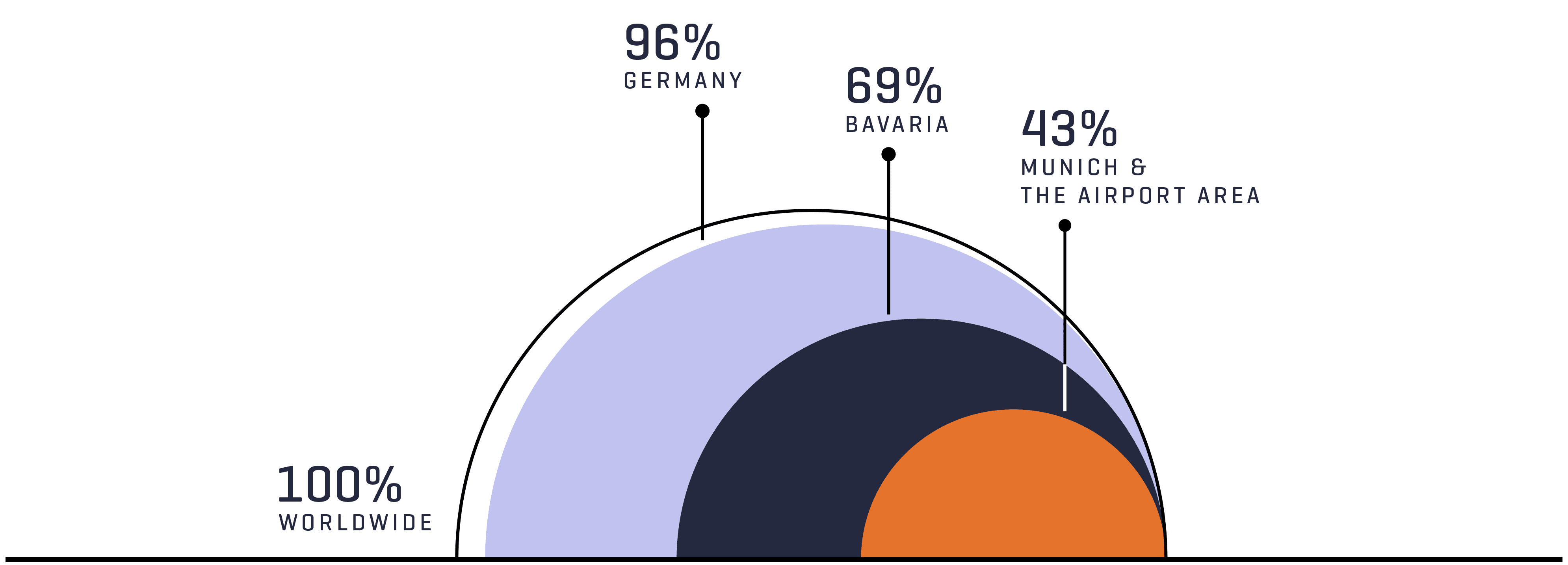Procurement: diverse demand for goods and services
Munich Airport procures a wide range of products and services required for the operation and expansion of an international hub airport. Our range of goods is comparable to that of a small town: the more than 130 product groups include everything from office supplies and road construction materials to vehicles and buildings. In 2024, the Munich Airport Group’s procurement volume amounted to around 798 million euros (net), representing a 23 percent increase on the previous year’s figure. To leverage synergy effects, all procurement activities of the specialist departments and subsidiaries are managed through central, Group-wide product group management – with some exceptions, such as food and beverages and retail products. This approach generated savings of 86 million euros in 2024. Since 2022, some subsidiaries have also been procuring goods in joint purchasing arrangements. Due to the large combined purchasing and sales volume, this bundling results in significant cost reductions.
Procurement processes: optimization through new board and automation
In November 2024, we established a Procurement Board at the request of the Executive Board. Its purpose is to help further optimize our procurement processes, make strategic purchasing decisions at an early stage, and promote even closer collaboration between the various divisions and Procurement. A key goal of the new board is to develop a long-term procurement strategy aligned with the overarching corporate targets. It is also intended to improve decision-making in the procurement process, particularly in complex procurement projects and strategic purchasing matters. In addition, binding decisions are to be made on strategic and interdisciplinary procurement topics – such as specific product groups, supplier management, and sustainability issues. The Procurement Board will also identify and mitigate risks – for example, in tender proceedings or within the supply chain.
As part of the introduction of S/4HANA, we are improving the entire procurement process (source-to-pay process). The focus is on full digitization, automation, and a user-friendly design of procedures. In particular, harmonizing individual process steps across the company will create greater transparency and deliver additional qualitative and economic benefits in FMG’s product group management. Moreover, the introduction of a new supplier management system will enable more efficient communication with business partners. This will not only strengthen collaborative partnerships but also make it possible to promptly and systematically gather information on requirements – for example, regarding sustainability topics. This ensures that these requirements are continuously met.
Public procurement law: transparent guidelines
Munich Airport operates as a sector contracting entity in the field of «ports and airports.» As such, it ensures its procurement policy is consistent with public procurement legislation. Where public contracts are involved, calls for tenders are issued on a Europe-wide basis in keeping with the binding regulations under procurement law. The Group normally puts contracts that are not subject to public procurement legislation to tender based on a formal, company-specific process. Bidders must confirm compliance with legal requirements when submitting their offers to exclude grounds for disqualification from the public procurement or tendering procedure. They must also prove that they comply with quality assurance and environmental management standards. All employees of FMG are also subject to a set of internal rules. The general principles of procurement are anchored in the company in the form of the «Ten Golden Procurement Rules,» which serve as a code of conduct for legally compliant procurement between the specialist departments and Procurement.
Purchasing: economic, ecological, and social standards
We award contracts on the basis of cost-effectiveness and place particular emphasis on the utilization of materials and products that are durable and use low levels of natural resources. For investment goods, any subsequent costs for servicing and maintenance (life cycle costs) are also considered. An awareness of sustainable procurement has already taken hold in our specialist departments. They specify economic, ecological, and social standards that are applied when purchasing goods and services. This applies equally to IT, building maintenance and construction, vehicle pool operations, and the purchase of promotional materials. When procuring promotional materials, the origin of the item, resource-friendly production, and recycling capability are important criteria. For vehicles and equipment in our fleet, we make sure to procure environmentally friendly and low-CO₂ options.
Supplier structure
Share of the airport’s procurement volume


Supply relationships: a focus on the region
A total of 3,873 suppliers worked with Munich Airport during the reporting year. Since Munich Airport is primarily supplied by regional business partners, transport distances are short and CO₂ emissions are low. Our subsidiary Allresto, for example, mainly purchases seasonal produce: nearly all of which originates from Bavaria, and a good 50 percent of which comes from the area directly around the airport. We evaluate our strategically important framework agreement partners using the following criteria:
Quality of the product or service
Service
Reliability
Competitiveness
Innovation and sustainability
We also regularly consult with suppliers on how to eliminate any quality deficiencies and realize potential for improvement.